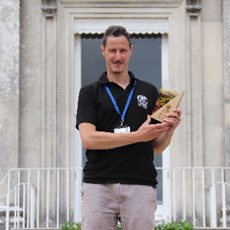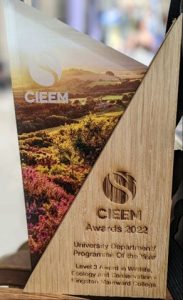Celebrating the CIEEM 2022 University Programme of the Year Award
The Wildlife, Ecology and Conservation (Level 3) at Kingston Maurward College, Dorset, has been awarded the University Programme of the Year Award by CIEEM. Brian Heppenstall (Programme Leader) kindly provides his thoughts for the CIEEM Academia SIG below.
 “After 22 years working in the conservation sector, I became Course Manager for Wildlife, Ecology and Conservation (Level 3) at Kingston Maurward College (Dorset) in March 2021.
“After 22 years working in the conservation sector, I became Course Manager for Wildlife, Ecology and Conservation (Level 3) at Kingston Maurward College (Dorset) in March 2021.
The core of the curriculum is wrapped around the City and Guilds Countryside Management qualification, but has been developed with consideration to the surrounding ecology, the skills of the staff, the needs of the industry and my own experience.
For entry, students are required to have grade 4 in English and Maths, and the course attracts a wide range of applicants. Currently we have around 60 students (split into two year groups) from age 16 (school leaver) to around 50 (career changer). Students are assessed academically and vocationally and assessments directly prepare students for the workplace, for example, the heathland unit has three assessments:
- Survey a heathland and identify threats (we use Natural England’s Common Standards Monitoring method for this).
- Write a management plan on the heathland habitat.
- Carry out management on heathland (this year we removed rhododendron, birch and gorse).
In considering topics to complement the set curriculum, we look at the latest thinking on industry gaps. For example the Bridging the Gap survey by Yorkshire Wildlife Trust highlighted several areas that we can address including:
- Self-motivation/initiative and communication skills were noted as being the most frequently lacking soft skills in entry-level applicants.
- In terms of soft skills, during the first week, students are tasked to look at a range of recent job vacancies and identify desirable/essential soft skills, recognise which of those are common and then consider which they feel they need to work on. Progress is discussed at tutorials and opportunities for improvement are considered.
- The course also provides opportunity for further development of soft skills, for example an environmental interpretation unit requires students create guided or self-guided interpretation (and deliver it). The course is also responsible for the delivery of the Colleges Bioblitz, with students able to apply for positions on the organisation group, all students get to play a part.
- Young people increasingly had a lack of knowledge of UK wildlife and ecology.
- We focus primarily on local habitats and local/regional case studies, unless the curriculum calls for a wider approach. For subjects that are assessed practically, i.e. heathlands, urban habitats etc, field trips and surveys, including species identification are undertaken. A popular aspect of the course is a weekly wildlife test, linking in relevance to seasonality, an upcoming assessment or a request from a student. The lighthearted weekly top 10 leaderboard brings out the competitive side of many students and I have heard from many that this element has helped their species knowledge increase.
 On the principle of “you can’t be what you can’t see” we also encourage a wide variety of guest speakers, from wildlife fiction authors, to AONB managers, innovators in urban stream management and wherever possible, course Alumni – all of which who can demonstrate to students what roles are available, what those roles consist of, and what next steps students need to take if they want to do similar roles in the future.
On the principle of “you can’t be what you can’t see” we also encourage a wide variety of guest speakers, from wildlife fiction authors, to AONB managers, innovators in urban stream management and wherever possible, course Alumni – all of which who can demonstrate to students what roles are available, what those roles consist of, and what next steps students need to take if they want to do similar roles in the future.
As well as developing their own skills, within the Managing Volunteers unit, students are also encouraged to consider how they encourage others. Both in terms of volunteers but also to consider accessibility within the industry and how they might improve/increase this when they enter positions of influence.
Similarly, we also aim to get off campus as much as possible. This can be to the local ancient woodland or heathland – on days where sunny weather means indoor lectures can be abandoned in favour of smooth snake/sand lizard surveys. Or it can be further afield, for example students were impressed at seeing urban river wildling in action and were wowed by a trip to a penned beaver relief (one student wrote “It was wonderful being able to actually see the impacts the beavers have on our landscape”).
Opportunities are being developed for the next academic year, with students invited to a days rewilding workshop & we are also working on a proposal for an audio trail on campus, students can play a part in the funding applications – and if successful – to lead the delivery stages.
Essentially the course prepares students to be industry ready for Ranger or Engagement roles upon graduation, with knowledge, experience (gained during 465 hours of work placement and at college) and abilities (for example students leaving this year will have certificates in Brushcutter and Chainsaw use). We are also a valuable step for those looking to enter into Higher Education, providing an understanding of the basis of monitoring, research and report writing.
We are still developing the course and would welcome any links with industry employers and collaborating with other further education, or higher education institutes.
We are incredibly grateful to CIEEM for recognition of this programme, and for Countryside Jobs Service for sponsoring the University Department / Programme of the Year Award.
The course, alongside others offered by Kingston Maurward can be found on our website.”
